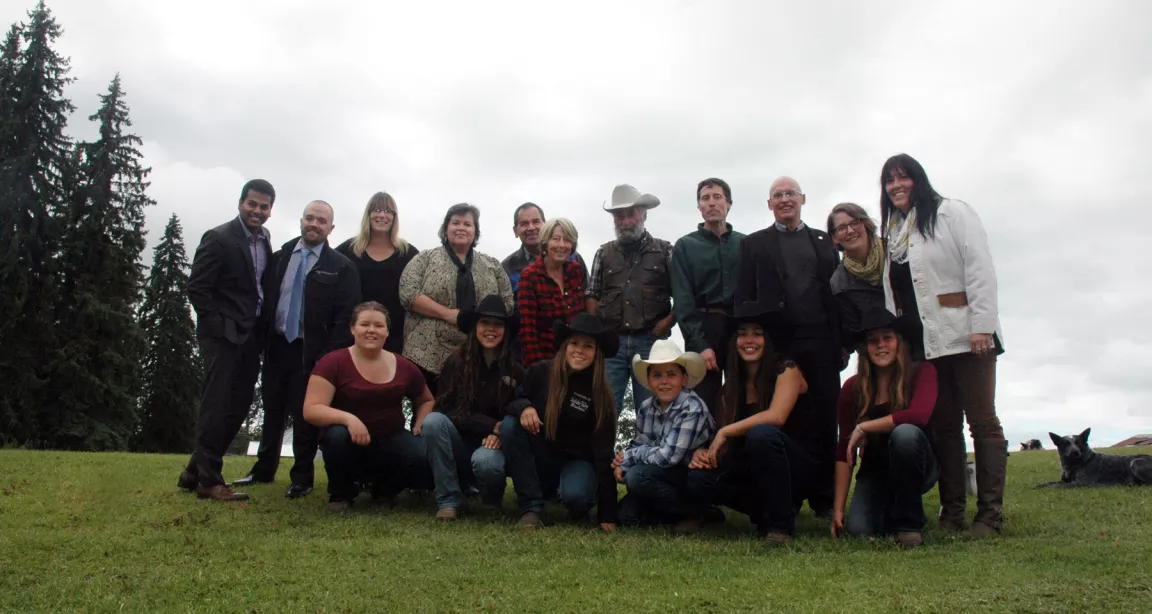UNBC Launches Cash and Bioenergy Crop Feasibility Study

Prince George, BC – A University of Northern British Columbia team of researchers will study whether crops such as specialty plants and vegetables, medicinal and natural health products, traditional First Nations crops and those for seed, grasses and hemp could be successfully grown in and around Vanderhoof, Fort St. James and the Bulkley-Nechako Regional District (BNRD).
The Bioenergy and Cash Crop Feasibility Study is funded through $83,500 from the Governments of Canada and British Columbia. It is scheduled to begin September 2016, and will also factor in anticipated changes in climate conditions in the region.
These changes may include increased temperatures during the growing season and winter, increased spring runoff/rainfall and decreased water availability during summer months.
A list of possible crops will be developed from the study that will allow producers in the BNRD and Northern B.C. to better understand the potential and suitability for growing these types of crops and to create a solid foundation of information on how these crops could be put into a production rotation in Northern B.C.
This initial feasibility study can lead into field scale demonstration research on prospective crops.
“I am thrilled with the award from the Governments of Canada and British Columbia,” said Dr. Geoff Payne, UNBC Interim Vice-President Research. “This is an important step in assessing the changing landscape of agricultural activity in the face of climate change.”
“This project highlights UNBC’s commitment to the sustainability of the communities of Northern B.C. through their development of viable agricultural crops. Communities will be active partners, a hallmark of research at UNBC. The lessons learned can have significant impacts regionally and be shared to enhance northern agriculture more broadly.”
Funding for this project has been provided by Governments of Canada and British Columbia through the Canada-BC Agri-Innovation Program under Growing Forward 2, a federal-provincial-territorial initiative. The program is delivered by the Investment Agriculture Foundation of BC.
Nak’azdli Whut’en First Nation and Chan Sisters Foundation are also funding the project.
“Nak’azdli Whut’en sees the need for economic diversification and welcomes this opportunity to partner on this project,” said Nak’azdli Whut’en Coun. Fred Sam. “Looking ahead, we anticipate this study will springboard new opportunities for the community and region.”
The purpose of the project is to promote agricultural diversification and development, increase the value per acre of cultivated agricultural land, create prosperous and self-sustainable communities with the addition of new crops and value added facilities and identify new renewable bioenergy sources.
The project concept began in early 2015, when Sagar Saxena from UNBC’s Office of Research met with the local community in Vanderhoof to find out their needs for economic diversification. During these discussions agriculture diversification from unique cash crops, value addition, energy production from biomass, national and international market opportunities, youth retention and youth in business, job creation and business development were common areas of interest.
There are opportunities to meet export markets and discover advanced farming techniques to meet higher demand, address food and energy security and sustainability issues and increase the number of highly-skilled individuals, creating a knowledge-based economy.
Some crops that will be studied include lavender, gourmet garlic, herbs, ginseng, Echinacea and other medicinal plants, including motherwort, calendula, camelina, hops, quinoa, spelt, amaranth, seed and bioenergy crops, such as grasses and hemp. Innovative potential new crops may be added to this list of potential crops.
“The project will take into account current practices, existing infrastructure such as farming equipment and processing facilities, new market opportunities and anticipated changes in climate,” said UNBC Environmental Engineering professor Dr. Steve Helle, who is the principal investigator of the project’s feasibility study.
“These changes may enable local producers to explore new potential with crops that have not traditionally been grown commercially in the BNRD and that while unsuitable today may become increasingly suitable over time.”
Dr. Helle will be joined by Dr. Bill Deen from the University of Guelph, and research project officer, Sagar Saxena. The team also includes Erica Nitchie from the Government of British Columbia, Vince Prince from the Aboriginal Business Development Centre, Matt Dickson with Hallbar Consulting, and Geoff De Ruiter and Serena Black. De Ruiter is currently a UNBC PhD candidate, while Black is a UNBC Master of Science Natural Resources and Environmental Studies graduate who focused on agricultural research.
The research will incorporate local knowledge from project partner Little Valley Farms. In-kind support is provided by Aboriginal Business Development Centre, Government of British Columbia, and UNBC.
-30-